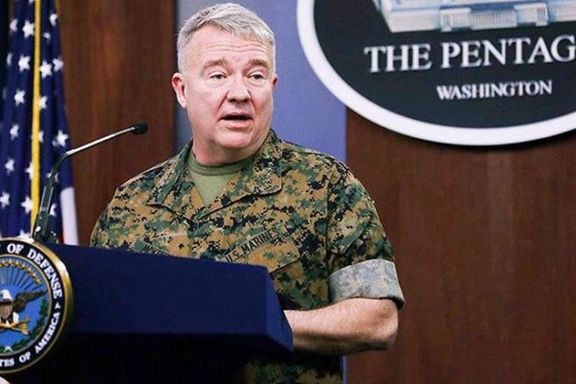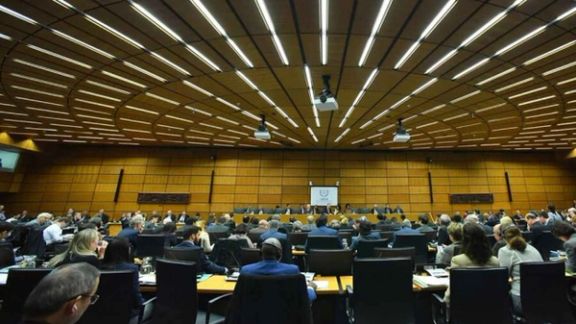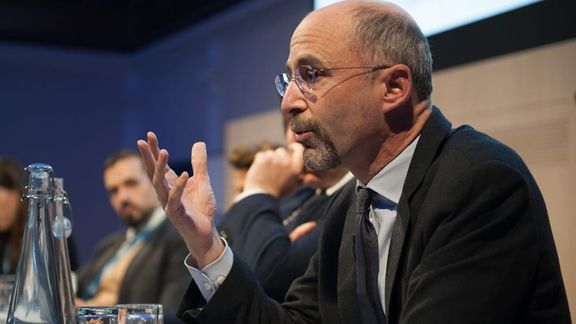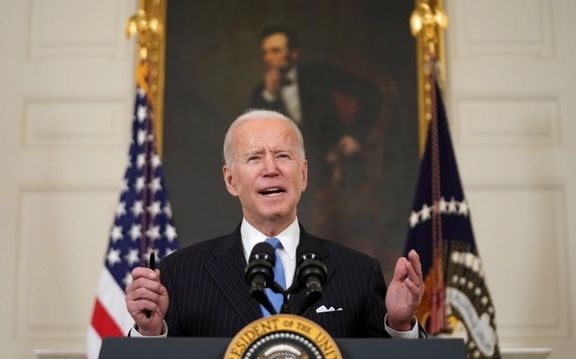CENTCOM Chief Says His Forces Are Ready If Nuclear Talks With Iran Fail

General Kenneth McKenzie, commander of CENTCOM has told Time magazine that US forces are ready for orders if the upcoming nuclear talks with Iran fail.

General Kenneth McKenzie, commander of CENTCOM has told Time magazine that US forces are ready for orders if the upcoming nuclear talks with Iran fail.
“Our president said they’re not going to have a nuclear weapon. The diplomats are in the lead on this, but Central Command always has a variety of plans that we could execute, if directed,” McKenzie said.
After Iran suspended nuclear talks in Vienna in June and kept postponing the resumption of talks, the Biden Administration started issuing warnings in recent weeks that “other options” are available to deal with a fast-advancing Iranian nuclear program. Iran finally agreed to resume talks on November 29, but it has toughened its position.
General McKenzie also said that Iran is very close to obtaining a nuclear weapon, adding, “I think they like the idea of being able to breakout.”
Tehran is demanding the removal of all US sanctions imposed since 2018, all at once, and verification of the result. It is also demanding that the Biden Administration provide guarantees that no future US government would withdraw from an agreement.
Former President Donald Trump abandoned the 2015 Joint Comprehensive Plan of Action, or JCPOA, in 2018, saying it was inadequate in preventing Iran from obtaining nuclear weapons.

Iran has criticized the three European members of the JCPOA in Vienna on Thursday for their statement on Wednesday raising alarm over its nuclear activities.
Mohammad Reza Ghaebi, Tehran’s envoy to the International Atomic Energy Agency (IAEA) spoke at the ongoing meeting of the agency’s Board of Governors saying that the United Kingdom, France and Germany (E3) have failed to stand up to US maximum pressure sanctions and instead criticize his government.
Ghaebi defended Iran’s decision to reduce IAEA inspections of its nuclear facilities and Tehran’s accelerated uranium enrichment process, insisting that purifying fissile material to 60 percent is within Iran’s rights under international conventions.
The E3 in their statement had warned that the higher-degree enrichment has no civilian purpose and demanded that Iran immediately return to its obligations under the Joint Plan of Action, or JCPOA, which allows only 3.65 percent enriched uranium.
Ghaebi reiterated Iran’s position that the only reason for the current crisis is the actions of the United States by withdrawing from the JCPOA and imposing sanctions. He also repeated Tehran’s demand that sanctions should be “verifiably” removed before there can be a new deal. He said as along as US sanctions remain in place no one should expect continence by Iran.

United Kingdom, France and Germany delivered a statement at a meeting of the UN nuclear watchdog, IAEA, expressing deep concern over Iran’s nuclear activities.
The E3, as the three counties are known within the framework of the Iran nuclear talks, said that Iran has been escalating its nuclear program “systematically” for two years, “permanently and irreversibly upgrading its nuclear capabilities”.
The United States also issued a statement in Vienna, voicing strong support for the efforts of the International Atomic Energy Agency monitoring efforts. US officials also reiterated that they are ready to reach an agreement with Iran to revive the 2015 Joint Comprehensive Plan of action, or JCPOA.
The E3 were mainly referring to Iran’s uranium enrichment which has increased both in quantity and quality since 2019 as a reaction to the US withdrawal from JCPOA. But the enrichment took another leap this year when Tehran said it is enriching to 60 percent, getting close to the 90-percent uranium purity needed for a nuclear bomb.
Warning of the inherent risk to the international community, the E3 declared, “Iran has no plausible civilian justification for both 20% and 60% enrichment and the production of High Enriched Uranium (HEU) is unprecedented for a State without a weapons program.”
They went on to say that Iran has already stockpiled enough fissile material to produce more than one nuclear bomb and continues to make advances that reduce its breakout time. Significantly, the E3 warned that these escalations and advances “are irreversibly reducing the counter-proliferation value of the JCPOA.”
The E3 also expressed deep concern over Iran’s decision to reduce cooperation with the IAEA since early this year, curtailing its monitoring activities and stonewalling on providing answers to the nuclear watchdog’s questions about its past activities.
The European powers pointed out that IAEA Director General Rafael Grossi visited Tehran twice since September, but Iran failed to resolve these issues. “It is essential that Iran returns to full implementation of JCPOA-related IAEA monitoring arrangements,” the statement said.
While the statement is a stern warning to Iran, it is not clear if the E3 and the United States would table a proposal at the IAEA Board of Governors meeting to censure Iran.

The United States will not stand idly by if Iran gets too close to a nuclear weapon, US Special Envoy Rob Malley has said ahead of next week's nuclear talks.
"If they start getting too close, too close for comfort, then of course we will not be prepared to sit idly by," he told National Public Radio in an interview, according to excerpts released by the US broadcaster. The excerpts of the interview released on Wednesday did not address what he meant by "too close" nor US options in that case.
Indirect talks between the United States and Iran are set to resume in Vienna on Monday with the other members of the 2015 nuclear deal - Britain, China, France, Germany and Russia - shuttling between the two sides because Iranian officials refuse to meet directly with their US counterparts.
Iran has adopted a tougher negotiating position in recent weeks, demanding the US lift sanctions all at once before an agreement is reached in the Vienna talks. It has also demanded guarantees from the Biden Administration that future US governments will not withdraw from an agreement, a proposition the White House cannot deliver on given US constitutional provisions.
US President Joe Biden is trying to revive the 2015 deal, under which Iran agreed to limit its nuclear program in return for relief from US, UN and EU sanctions. Biden's predecessor, Donald Trump, abandoned the agreement in 2018 and reimposed sanctions, prompting Iran to begin violating its nuclear limits by enriching uranium at higher levels.
This has led to alarm in many capitals as it would bring Iran closer to the threshold of nuclear weapons, while multilateral talks are dragged out.
"If they choose not to go back into the deal, then obviously we're going to have to see other efforts - diplomatic and otherwise - to try to address Iran's nuclear ambitions," the US Special Envoy for Iran said in the interview, which was recorded on Tuesday and is scheduled for broadcast on Friday.
A trip by Rafael Grossi, the head of the International Atomic Energy Agency (IAEA) to Iran on Tuesday to resolve limitations on monitoring failed. Iran’s refusal to give full access to the UN nuclear watchdog might have a negative impact on the upcoming talks.
Malley said that if Iran chose not to revive compliance with the agreement and instead dragged its feet at the negotiating table and continued to accelerate its nuclear program "we'll have to respond accordingly ... the options that are at America's disposal are, you know, they're familiar to all."
With reporting by Reuters

Rafael Grossi, head of the IAEA told the agency’s governors Wednesday that his talks in Tehran were inconclusive in resolving issues in Iran's nuclear program.
Grossi’s trip to Iran ended Tuesday with statements from both sides that stressed their commitment to cooperation but left hanging questions raised by the IAEA(International Atomic Energy Agency)over the access of nuclear inspectors and the discovery of uranium traces in three locations undeclared as nuclear sites.
Grossi met both the head of the Atomic Energy Organization of Iran, Mohammad Eslami, and Iranian foreign minister Hossein Amir-Abdollahian seeking IAEA access to a manufacturing workshop in Karaj, west of Tehran, to service cameras and monitoring equipment.
Asked by Iran International at a press conference following the board meeting about ambiguous comments from Eslami that the IAEA chief had confirmed in discussions there had been “no violations” in Iran’s nuclear program, Grossi suggested Eslami might have referred to past agency reports confirming it had found no diversion of nuclear material.
Grossi said time for bridging the disagreement over Karaj “is ending” that that the agency was approaching “a point where we are not able to guarantee bring fully informed.”
Grossi has argued that Iran agreed the access under a temporary arrangement in September, whereas Iran argues it is barring access due to a security review in the facility after it was attacked in June, reportedly by a drone.
The disappointment of the IAEA chief’s visit comes days before talks resume in Vienna November 29 to revive Iran’s 2015 nuclear deal with world powers, the JCPOA (Joint Comprehensive Plan of Action).
"Despite my best efforts, these extensive negotiations and deliberations to address Iran's outstanding safeguards issues, detailed in the two reports, proved inconclusive," Grossi told the 35-nation board of governors as its quarterly meeting opened Wednesday.
Iran since February has restricted IAEA access more or less to that required under safeguards provisions of the Nuclear Non-Proliferation treaty, but Grossi managed that month to agree on an arrangement allowing a greater level of access, which he said gave the agency a clearer ability to detect any breaches.
While the agency would be expected to monitor a revived JCPOA, it has no direct role in the Vienna talks. Nonetheless, the apparent standoff between Iran and IAEA, both over the Karaj workshop and Iran’s unexplained past nuclear activities, may sour the atmosphere for the talks.
The Vienna negotiations have been suspended since June, but diplomatic and political maneuvering has continued apace, with speculation as to exactly what stance the new Iranian negotiating team will take.
The talks previously struggled to agree which United States sanctions should be lifted for Washington to return to the JCPOA, which previous president Donald Trump left in 2018, and exactly how the Iranian nuclear program, expanded and developed since 2019, would be brought back within JCPOA limits.
While talks in Vienna are formally between remaining JCPOA signatories – China, France, Germany, Iran, Russia, and the United Kingdom – US diplomats take part indirectly.
The IAEA has also told member states that Iran has subjected its inspectors to "excessively invasive searches, which resulted in them feeling intimidated."
The Wall Street Journal cited two diplomats who claimed Grossi had rejected an Iranian offer to allow access to Karaj in return for the agency dropping its questioning of the unexplained uranium traces in Iran’s past nuclear work. The Journal said talks between the IAEA and Iran “continued overnight” but gave no details.

The State Department has reiterated that nuclear talks with Iran cannot go on indefinitely and the US will turn “to other means”, being discussed with allies.
Spokesman Ned Price in his Tuesday briefing insisted that diplomacy remains the preferred path for the Biden Administration to restore the 2015 nuclear agreement known as JCPOA, but Iran needs to show good faith.
Multilateral talks suspended in June are scheduled to resume next week in Vienna, where the United States will participate indirectly in negotiations between Iran and other world powers.
Price said, if the Iranians, “through their actions or through their inactions, demonstrate or suggest that they lack that good faith, that they lack that clarity of purpose, we’ll have to turn to other means. We have a variety of other means. We’re discussing those with our allies and partners. In the category of things that aren’t prudent to discuss from here, that’s one of them.”
Price rejected the suggestion of offering Iran any incentives, or “greasing the wheels”, ahead of an agreement, as Tehran has demanded the release of frozen funds as a sign of US goodwill. “We have been very clear that we are not prepared to take unilateral steps solely for the benefit of greasing the wheel, as you said. We are prepared to engage in a mutual return to compliance with the JCPOA,” he maintained.
The spokesman was asked if the Administration is sympathetic to the idea of an interim deal. Reported in the media last week. Price dismissed the idea, insisting that Washington is “sympathetic to testing the proposition as to whether we can achieve a mutual return to compliance with the JCPOA.”
Asked how long it would take for the US to determine if the Iranians are negotiating in good faith, Price pointed to the indirect nature of the talks and said the US has to hold “deep consultation” with the participants in the talks, meaning the United Kingdom, France, Germany, Russia, China and EU diplomats.
Price also reiterated the Biden Administration view that the JCPOA “ is the best, it’s the most effective means by which to reapply…permanent and verifiable restrictions on Iran’s nuclear program permanently, preventing Iran from obtaining a nuclear weapon.”
At the same time, former secretary of state Mike Pompeo tweeted on Tuesday that the Trump administration “rightly withdrew from the JCPOA, as it provided a clear pathway for Iran to develop a nuclear weapon. We kept Iran under max pressure while fostering new relationships among those who partnered with us. Now, the Biden Admin wants to re-enter the JCPOA.”